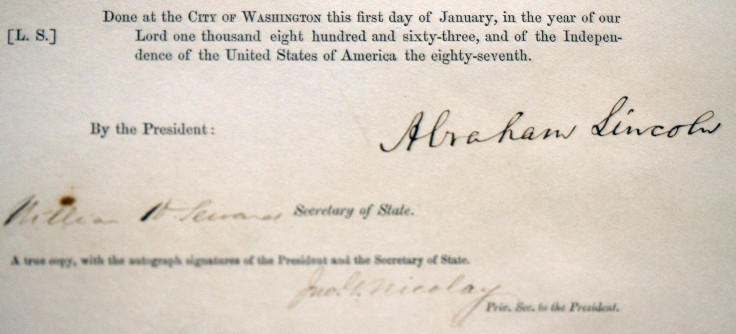Juneteenth 2015 Quotes: 10 Sayings About Slavery, Freedom On 150th Anniversary Of Texas Emancipation

Friday is the 150th anniversary of Juneteenth, a summer celebration marking the end of slavery in Texas. Although then-President Abraham Lincoln issued the Emancipation Proclamation in 1862, the war was still going through April 1865. Even when Confederate Gen. Robert E. Lee surrendered, it took weeks to slowly spread throughout the South. On June 19, 1865, Union soldiers under Maj. Gen. Gordon Granger arrived in Galveston, Texas, and announced the war was over. Granger read out General Order No. 3.
It said: “The people of Texas are informed that, in accordance with a proclamation from the Executive of the United States, all slaves are free. This involves an absolute equality of personal rights and rights of property between former masters and slaves, and the connection heretofore existing between them becomes that between employer and hired labor. The freedmen are advised to remain quietly at their present homes and work for wages. They are informed that they will not be allowed to collect at military posts and that they will not be supported in idleness either there or elsewhere.”
The more than 250,000 slaves living in Texas rejoiced, according to the Smithsonian magazine. They sang and danced and left their owners to travel to the North and reunite with their families nearby.
Since then, Juneteenth has become a cultural observance of Emancipation Day, especially among African-Americans. People throw parades, attend barbecues, play baseball and discuss civil rights in the name of patriotism. They play games and work toward self-improvement. Juneteenth is a "source of strength" for young black people, historian Elizabeth Hayes Turner told PBS in 2013. More than 40 states recognize it as a holiday.
On this 150th Juneteenth, read what Americans have said about slavery and emancipation, collected from NotableQuotes and Goodreads:
“Whenever I hear anyone arguing for slavery, I feel a strong impulse to see it tried on him personally.” - Abraham Lincoln
"Well, the way it was explained to me, the 19th of June wasn't the exact day the Negro was freed. But that's the day they told that they was free ... and my daddy told me that they whooped and hollered and bored holers in trees with augers and stopped it up with powder and light that, and that would be their blast for the celebration." - Charles Morgan, Texas resident quoted in an essay on freedom
“Knowledge makes a man unfit to be a slave.” - Frederick Douglass
"Slavery is no scholar, no improver; it does not love the whistle of the railroad; it does not love the newspaper, the mail-bag, a college, a book or a preacher who has the absurd whim of saying what he thinks; it does not increase the white population; it does not improve the soil; everything goes to decay." - Ralph Waldo Emerson
"Negro slavery is an evil of colossal magnitude." - John Adams
"Every year we must remind successive generations that this event triggered a series of events that one by one defines the challenges and responsibilities of successive generations. That’s why we need this holiday.” - Texas Rep. Al Edwards
"I freed a thousand slaves I could have freed a thousand more if only they knew they were slaves." - Harriet Tubman
"My people have a country of their own to go to if they choose... Africa... but, this America belongs to them just as much as it does to any of the white race... in some ways even more so, because they gave the sweat of their brow and their blood in slavery so that many parts of America could become prosperous and recognized in the world. " - Josephine Baker
"Slavery is theft -- theft of a life, theft of work, theft of any property or produce, theft even of the children a slave might have borne." - Kevin Bales
"Anytime anyone is enslaved, or in any way deprived of his liberty, if that person is a human being, as far as I am concerned he is justified to resort to whatever methods necessary to bring about his liberty again." - Malcolm X
© Copyright IBTimes 2024. All rights reserved.






















